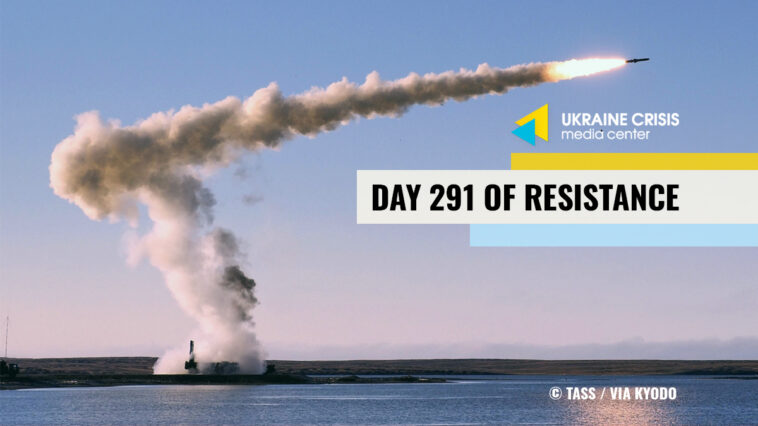Russian forces shell residential area of Kherson, killing two and injuring five
The Russian forces shelled Kherson several times on Monday. Earlier in the day, a Russian artillery strike hit the city and its suburbs, killing a woman and injuring four others. Russia continues to strike de-occupied Kherson every day, damaging critical infrastructure and killing civilians.
Russia builds 360 missiles since invasion, Ukraine’s defense intelligence says
Since the invasion, Russia has been able to build 360 cruise missiles, representative of the Main Intelligence Department of Ukraine’s Defense Ministry General Vadym Skibitskyi told The New York Times.
“While Russia’s stockpiles of its most modern, precision missiles are widely believed to be running low, General Skibitsky said that Russian arms factories had been able to build 240 precision Kh-101 cruise missiles and about 120 of the sea-based Kalibr cruise missiles since the start of the war, which works out to about 40 new missiles per month. Those numbers could not be independently confirmed,” the article says.
The [Kh-55] missile, and the bomber that most likely delivered it during one of the recent attacks, was part of a cache of weaponry handed over to Russia by Ukraine in the 1990s as part of an international agreement aimed at assuring Ukraine’s sovereignty and territorial integrity, General Skibitsky said. As part of the 1990s agreement, known as the Budapest Memorandum, Ukraine agreed to relinquish its nuclear arsenal — the world’s third-largest at the time.
Despite Western sanctions, Russia has continued to produce new precision missiles, as recently as October, according to a report released last week by Conflict Armament Research.
EU foreign ministers do not yet approve ninth sanctions package against Russia
European Union foreign ministers did not yet approve a whole ninth package of sanctions against Russia at the Foreign Affairs Council on Monday, EU High Representative for Foreign Affairs Josep Borrell said.
Borrell said there had been disagreement on some of the content and its possible impact. It was not about one specific Member State.
“There is no 100 per cent agreement, so it means that some Member States do not agree. But I cannot go into details and point [at them]. Work continues (…). I am fully confident that we will reach an agreement. It is not about one specific Member State. It is a matter of what kind of exceptions we can implement in order to be sure that our sanctions do not have collateral effects, and at the same time that we do not empty the effectiveness of the sanctions,” the EU foreign policy chief said.
The European Commission on Wednesday proposed a ninth package of sanctions on Russia over its invasion of Ukraine that is to be approved by the member states.
EU Commission President Ursula von der Leyen said it favored new sanctions against three additional Russian banks and new export controls and restrictions. It also lays the basis to complicate Russia’s access to drones.
Podcast Explaining Ukraine. Villages that no longer exist. Stories from our trip to the frontline
We visited villages between Izyum and Slovyansk which were wiped off the face of the Earth in the spring. We talked to people still living there. Their living conditions are horrible. Listen to our dispatches from these places.
Podcast Explaining Ukraine. Why is Russia so hostile to the “West”? An attempt at a cultural history.
Russian hostile propaganda against the “West” and the democratic world has been getting ever more insane over the past years. But the “anti-Western” topics in Russian propaganda have deep cultural roots. The opposition to the “West” has been a recurrent topic in the thinking of key Russian intellectual figures, regardless of their ideology. In this episode, we try to analyze and understand these roots.




